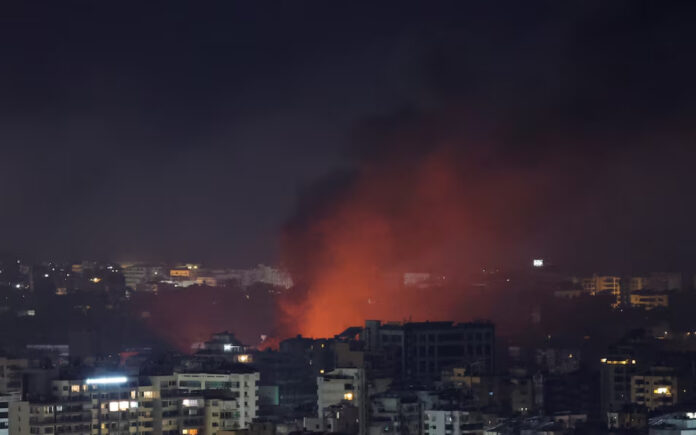Jerusalem/Beirut: Israel announced on Wednesday that eight of its soldiers were killed during combat operations in southern Lebanon, as the Israeli military launched an offensive against the Hezbollah armed group. This incident marks the deadliest loss for the Israeli military in the past year amidst ongoing border-area confrontations with its Iranian-backed Lebanese adversary.
Hezbollah confirmed that its fighters engaged Israeli forces within Lebanon on Wednesday, reporting ground clashes for the first time since Israeli troops crossed the border. The group claimed to have destroyed three Israeli Merkava tanks using rockets near the border town of Maroun El Ras.
Israeli Prime Minister Benjamin Netanyahu addressed the nation in a condolence video, stating, “We are at the height of a difficult war against Iran’s Axis of Evil, which wants to destroy us. This will not happen because we will stand together and with God’s help, we will win together.”
The Israeli military indicated that both regular infantry and armored units were participating in the ground operations in Lebanon, a day after Iran launched more than 180 missiles into Israel. This significant missile strike raised concerns about a potential escalation of conflict in the oil-rich Middle East. Iran characterized its missile volley—its largest assault on Israel to date—as a response to provocations, suggesting that no further strikes were planned barring additional provocations.
In a related incident, a 38-year-old Palestinian from Gaza became the only known casualty from Iran’s missile attack. Sameh Khadr Hassan Al-Asali was killed by falling debris while staying at a Palestinian security forces compound in the West Bank, during the Tuesday attack, which Israeli authorities stated was largely thwarted by its air defense systems.
Hezbollah further reported that it had repelled Israeli forces near several border towns and fired rockets at military positions within Israel. Mohammad Afif, the media chief of Hezbollah, asserted that these engagements were only “the first round” and emphasized that the group possessed sufficient fighters, weaponry, and ammunition to counter Israeli advances.
The Israeli military’s inclusion of infantry and armored troops from the 36th Division, including the Golani Brigade, the 188th Armoured Brigade, and the 6th Infantry Brigade, suggests an escalation beyond limited commando operations. Officials have stated that the current incursion aims to dismantle tunnels and other border infrastructure, with no plans for a broader assault on the Lebanese capital, Beirut, or major southern cities.
Despite this, Israel issued new evacuation orders for around two dozen towns along its southern border, instructing residents to relocate north of the Awali River, which is approximately 60 kilometers (37 miles) north of the Israeli frontier.
Also Read | Biden Rejects Support for Israeli Strikes on Iranian Nuclear Facilities Amid Rising Tensions
Intensifying Conflict Along the Israel-Lebanon Border
Early on Wednesday, Israel resumed its bombardment of Beirut’s southern suburbs, where Hezbollah maintains its headquarters, conducting over a dozen airstrikes against alleged Hezbollah targets. Additionally, an airstrike on a residential building in the Mezzah suburb of Syria’s capital, Damascus, reportedly killed three civilians and injured three others, according to Syrian state media. Israel has consistently targeted Iran-linked sites in Syria for several years.
According to Lebanese government statistics, over 1,900 individuals have been killed and more than 9,000 wounded in Lebanon amid nearly a year of cross-border hostilities, with most casualties occurring in the past two weeks. Caretaker Prime Minister Najib Mikati reported that approximately 1.2 million Lebanese have been displaced due to Israeli assaults.
Malika Joumaa, a Sudanese national, recounted her family’s plight after being forced to seek refuge in Saint Joseph’s church in Beirut. She and her family were displaced from their home near Sidon in southern Lebanon. “It’s good that the church offered its help. We were going to stay in the streets; where would we have gone? We were [sheltering] under the bridge; it is not safe. If we go back home, it is not safe; they are striking everywhere,” she stated.
Iran characterized Tuesday’s missile attack as retaliation for Israeli assaults against militant leaders, including Hezbollah chief Hassan Nasrallah, and for Israel’s military operations against Palestinian Hamas fighters in Gaza. The general staff of Iran’s armed forces warned that any Israeli retaliation would result in “vast destruction.”
U.S. news outlet Axios reported on Wednesday that Israeli officials indicated a “significant retaliation” against Iran’s attack would be launched within days, potentially targeting oil production facilities and other strategic sites within Iran.
The Biden administration is working to align its position with Israel regarding any response to Iran’s aggression while recognizing the precarious situation in the Middle East. U.S. Deputy Secretary Kurt Campbell noted that a broader escalation could threaten both U.S. and Israeli interests.
President Biden participated in a call with Group of Seven (G7) leaders on Wednesday to coordinate a unified response, which may include new sanctions against Tehran. The G7 leaders expressed “strong concern” over the escalating crisis in the Middle East, emphasizing that a diplomatic resolution remains feasible and that a region-wide conflict serves no one’s interests.
Also Read | Hamas Claims Responsibility for Deadly Tel Aviv Attack in Jaffa
Anxiety and Apathy Amid Rising Tensions in Iran
On social media, many Iranians expressed anxiety over potential Israeli reprisals, drawing parallels to the devastating eight-year conflict with Iraq in the 1980s, which claimed approximately one million lives. Nima Mokhtarian, an NGO worker, remarked, “The destruction of generations, young people being cannon fodder, the enrichment of generals and elites, and the empowerment of extremists? Leaders will not pay for dragging Iran into war.”
Some Iranians feel their government had no option but to respond with missile attacks on Israel, yet they remain apprehensive about the consequences, particularly as Israel’s military, regarded as the most formidable in the region, prepares for potential retaliation.



